#zioness
Text
ok so the thing is that I think Jews have a right to be pissed that op of that post was a white person with klan member relatives who didn’t pick up on white supremacist dog whistles, but I also think op is very brave for posting that and their essential point is not one that people should shove under the rug, which is that white nationalists are a very present threat at the moment and many many people, both goysiche people of color and goysiche white people are extremely susceptible because they refuse to interrogate what antisemitism is and how they might have antisemitic thought patterns and partake in antisemitic ideology. Like this is not the time for self congratulatory claps on the back when the basic point is very real and like two days after 10/7 I found people reblogging a link that lead to a daily stormer affiliated site because they wanted to prove those zionesses lied just so much about being raped. Lots of white nationalists say Zionist, not Jew -although plenty are saying Jews and you’re acting fine with it if it’s in the right circumstances - and you need to open your eyes.
121 notes
·
View notes
Note
Hi! I was wondering if you had any resources/articles/suggestions for readings about leftist zionism? As in zionists who are also left wing? I've tried Google but it was a very useless search lol
Worse than useless. If you don't already know some of the keywords, just searching for "leftist Zionist" gives you pages and pages of fanfic from Mondoweiss or Al-Jazeera about how surely now the Jews are about to abandon Israel (and pay no attention to their previous 10-20 years of false predictions). When in fact what we have seen is unprecedented engagement and intervention in Zionist society. Pretty much all diaspora Jewry is united against what the current Otzma Yehudit government stands for. The Histadrut trade unionists launched a general strike that convinced Netanyahu to shelve his court overhaul plan. These are not people who are giving up. When you compare the results of public action engagement on the Israeli court overhaul plan versus that of, say, the overturn of Roe vs Wade, or the Wall Street bank bailout, or the lead-in to the Iraq War, it looks like Israeli progressives have had more success than the Americans.
Some groups you should look into:
Ameinu
Habonim Dror
Hashomer Hatzair
Zioness
Some other sources and thoughts on progressive / leftist Zionism can be found HERE and HERE. (Note that I should have included Ritchie Torres and Anshel Pfeffer on that list.)
Hope that helps!
35 notes
·
View notes
Text
To Zionists, Zionism comes before Solidarity
I've been remembering the time my "progressive" or at least liberal Jewish community had a rabbi come in to tell us that BLM was dangerous because it didn't support Israel, and on no condition should we support it. He said, (paraphrased) "It's important to oppose police brutality and racism in America, but as Jews, we have to stand by Israel, and we can't let any progressives challenge its legitimacy." And everyone just nodded along. I didn't know much about BLM and wasn't much of an activist then. And so I, like the others there, treated this rabbi like a fountain of knowledge and swallowed the propaganda I was fed. I didn't join any demonstration led by BLM, because BLM was against the Jews. I didn't go to pride because pride was also against the Jews (someone had made a social media post about no Israeli flags being allowed).
This rabbi could have told us to march in solidarity with Black Americans and still be quietly zionist, and people would have done it. They would have been shitty allies, but they would have shown up at a time when that particular city was really struggling to mobilize. Jews are taught to be skeptical of progressive causes, and thus, of the people that these causes are fighting for. Astroturfing orgs like Zioness convince members that pride orgs, BLM, etc. are all out to get the Jews. And they convince these ignorant Jews to stick with these pseudo-progressive Jewish orgs that are actually anything but.
This was in 2017. I've learned to use my brain since then. I've wanted to write about this particular incident for over a year, but I don't know if I have more to say other than "this was fucked up, huh" because it's not unusual for synagogues and community centers to host speakers like this, speakers who use the language of Jewish community and Jewish trauma to make sure Jews never listen to any voices that aren't Zionist. I remember exactly where I was sitting in that room, but I doubt anyone else there has any memory of it at all. The others who attended may have been disappointed that this great rabbi did nothing more than repeat (racist) talking points they had already heard and believed.
It's a hard story to expand on because stuff like this is so commonplace in the American Jewish world. I once studied with a different "social justice rabbi" who described illegal Zionist settlements in the West Bank as "peaceful villages where we coexisted with the Arab residents." He proudly names the settlement where he was ordained on his website, describing it as being "in Israel." This was another rabbi who taught me to keep progressive causes at arm's length--best to stick with the (right kind of) other Jews. Proudly talking about his time in a settlement, all while arguing for raising the minimum wage and stopping police brutality. And now he's partnering with progressives all over the state as an educator. These people clearly don't know the racism he pushes. Or they turn a blind eye because Zionism is the one racism that (some) progressives will accept.
Don't let that be the case in your communities. Don't let Zionism go unchecked and unchallenged, even if it's from a respected religious leader.
(The American "progressive orthodox" world has really been showing its ass of late. The progressive-ish group Torat Chayim Rabbis, known for its statement against conversion therapy, has been doing PR for the occupational forces on its Facebook page: https://www.facebook.com/ToratChayimRabbis)
8 notes
·
View notes
Text
the night under the stars
Read this masterpiece on AO3 at https://ift.tt/SFz7Nq1
by zioness
in which iwaizumi mends the wounds of oikawa's heart
Words: 303, Chapters: 1/1, Language: English
Fandoms: Haikyuu!!
Rating: Not Rated
Warnings: Creator Chose Not To Use Archive Warnings
Categories: M/M
Characters: Iwaizumi Hajime, Oikawa Tooru, Aobajousai Volleyball Club
Relationships: Iwaizumi Hajime/Oikawa Tooru
Additional Tags: Fluff, Hurt/Comfort, Tooth-Rotting Fluff
read it on AO3 at https://ift.tt/SFz7Nq1
1 note
·
View note
Text
Some time ago, like a few years back I got accused by some asshole tumblr folks of being antisemitic because I supported Palestine. I was told the group "Zioness" was in fact a good group who were only interested in promoting the Jewish faith. Going to their twitter page it's very clear they all for the ethnic cleansing currently going on. In conclusion, fuck these fuckers, and fuck the zionists shits on tumblr who support this shit.
Free Palestine.
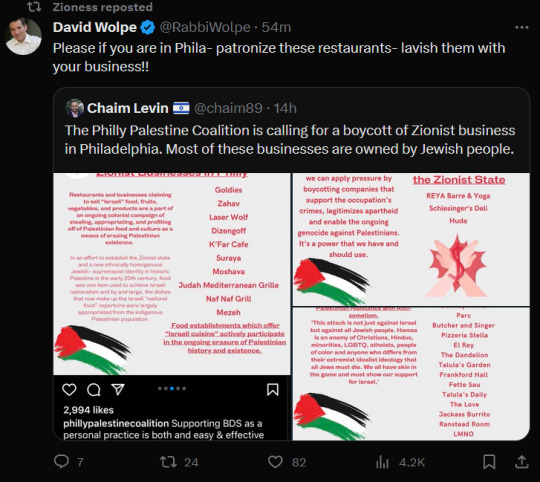
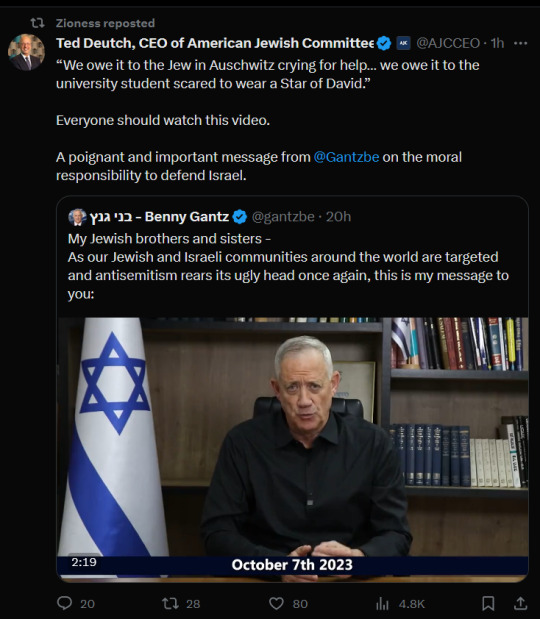
1 note
·
View note
Text
“I don’t feel betrayal as acutely as I feel like I’ve woken up from a naivete,” Rabbi Aaron Bisno, who at the time of the Tree of Life attack was leading services in a nearby synagogue, told The Times of Israel. “It turns out that our allies don’t see us as victims. They are not looking through a moral lens, they’re looking through a racial lens or an identity politics lens.”
On Saturday, October 7, thousands of Hamas terrorists swarmed into Israel, invading towns and villages around the Gaza border, slaughtering over 1,400 Israelis, mostly civilians — and committing atrocities including rapes, mutilations, beheadings and torture. At least 220 people were kidnapped, including children and the elderly.
[...]
“The Tree of Life story was one of defenseless Jews being attacked, at prayer, by surprise,” Bisno said. “They were all older, no one was fighting back and there was no recourse.”
The synagogue shooter, Bisno also pointed out, was a lone actor, and “everyone understands a crazy person doing terrible things.” But in the case of the October 7 massacre, he added, “People go immediately to the ‘What about?’ or, ‘Well, you have to understand that the Palestinians have been very angry for a long time,’ or whatever else.”
“Now we’re in a geopolitical debate about whether it’s justified,” he said.
At Jews for Racial and Economic Justice (JFREJ), a far-left organization aiming to combat racism and economic exploitation in New York City, executive director Audrey Sasson recalled that the Tree of Life shooting was “a moment where we were so clearly attacked and there wasn’t a counter-attack. We were attacked and we had time to grieve, we’ve been grieving.”
An JFREJ initial statement following the Hamas attacks was less unequivocal: “We recognize that attacks on civilians by Hamas are neither justifiable nor unprovoked.” Likewise, on October 11, the group posted on social media that it lit candles for the loss of life and “For decades of apartheid that have culminated in this moment.”
When it comes to the atrocities of October 7, Sasson told The Times of Israel, “There hasn’t been time to grieve because there was an immediate response, so I think that that has complicated the dynamic a little bit.”
More than 5,700 people have died in Gaza since Israel began its operation, according to unverified numbers given by the Hamas-run health ministry, which are believed to include its own terrorists and gunmen killed in Israel and Gaza, as well as victims of a blast at a Gaza City hospital on October 17 caused by an Islamic Jihad missile misfire that Hamas blamed on Israel. The humanitarian situation in the strip has also been concerning for the international community, as aid is starting to be distributed in Gaza.
“At Tree of Life when we had the vigil, our Muslim partners came to do security for us. It was a moment for that solidarity to be demonstrated and to be really fortified,” Sasson added. “It was a different type of moment and I think what our members are struggling with right now is that we haven’t had the time to process or grieve or anything.”
Amanda Berman, founder of a progressive Zionist group called Zioness, believes there are two main reasons why Jews in the United States are not being shown as much solidarity as they were after the Pittsburgh shooting.
“First of all, Americans love to politicize antisemitism by pointing to their perceived ideological enemies and accusing them of hosting it, without ever being willing to confront it in our own spaces,” Berman said. “So it was easy for people to call out white supremacist attacks in Pittsburgh, like it was when neo-Nazis marched in Charlottesville, Virginia.”
In addition, Berman said, “People are applying a simple oppressor/oppressed binary onto the conflict in a way that is leading them to totally misunderstand the history and actual dynamics on the ground.”
However, according to Bisno, the decision from other communities on whether or not to stand with Jews is also motivated by personal interest.
“In the States, the default if you think of an American is white male Christian,” he said. “[Tree of Life] was such an abhorrent thing, attacking Jews like this, that the Christian community wanted to make it very clear that this is not them.”
“Yes they were standing with the Jews, but they were really standing opposite the killer,” he added. “[October 7] is more complicated because they don’t identify with the Jews or the Muslims.”
[...]
After the death of George Floyd at the hands of police in Minnesota in 2020, Jewish activists across the country joined BLM protests. One young Jewish activist, who asked to remain anonymous, said she feels “mentally shattered” after the events of October 7.
“I don’t feel like I’m supported by other communities,” she said. “I think that’s mostly a result of those friends not really knowing what to say when it comes to Israel-Palestine.”
The activist said she is both understanding and also hurt by the lack of support.
“On one hand they want to condemn Hamas, but on the other, they see what’s happening in Gaza as a grave injustice and they don’t know if it’s acceptable to hold both truths, so they stay mostly silent,” she said. “Or they go extreme to one side.”
[...]
In her 2021 book, “People Love Dead Jews,” author Dara Horn discusses her impression that what people know about Jews is usually tied to their deaths and murders, but not so much to the lives they lived. The title of her book resonates with Bisno after the October 7 attack: “In many people’s minds this is the natural order of things,” he said. “It’s really chilling.”
Berman believes this is part of the reason why expressions of solidarity now are much weaker than those after the shooting in Pittsburgh.
“Antisemitism is so part of the air we breathe, so ingrained and institutionalized and systemic that people are not even conscious of their hypocrisy,” she said. “The radical left says ‘silence is violence,’ but somehow at the same time, rape is resistance.”
“They say we should believe all women, but then entertain the most obscene linguistic gymnastics to explain away the decapitation of babies,” she added. “It’s easy for the world to engage in performative mourning for dead Jews, but much more difficult for people to show up for Jews fighting for their lives.”
After the May 2021 escalation between Israel and Hamas in Gaza, JFREJ put in place a process to check in with members about how they orient to Israel and Palestine and what they need from JFREJ. The organization’s commitment, Sasson pointed out, is to “build a New York City where we can thrive; we do that in coalition with other communities.”
“I think those relationships that we’ve built over time have been coming through for us. It took a few days, I’m not going to say it was immediate,” she added. “Our partners are not necessarily experts on the Middle East. They do express concern and they do express solidarity.”
“It’s complicated for any group to say that they would stand for indiscriminate bombing,” she said, referring to Israel’s raids on the Gaza Strip.
[...]
In Pittsburgh, Bisno believes the lack of solidarity expressed in progressive groups is “incredibly disorienting” and “disheartening” for those in his community “who’ve spent years working in that progressive space, insisting that Jewish values are what motivates them being there on behalf of these other groups.”
“I think this may be a reckoning for how universalistic, how pluralistic, the liberal Jewish community is going to continue to be,” he added.
Berman believes that “American Jews are wondering whether we can continue organizing on justice issues with non-Jewish partners, given that the allyship model has obviously broken down completely — at least for us.”
However, she does not believe American Jews will cease to care about or fight for progress.
“What our activism looks like might change,” she added.
[...]
The Israel Policy Forum’s Michael Koplow, too, believes that American Jews’ deep commitments to social justice are philosophical, ideological and not transactional — but that what they are now experiencing can be emotionally traumatic.
“In some ways I think that actually makes this even more difficult because there are many American Jews who are still going to feel the need for these types of commitments and still feel that these things are important, but are now going to have pause because of these feelings of betrayal and abandonment,” he said.
According to Koplow, the feeling of loneliness the community may be experiencing since October 7 will “change the ways in which American Jews might be willing to show up as quickly and in the same numbers for other groups.”
“It definitely seems to me that in many of these more activist spaces, the price of entry has been setting Zionism aside,” he said.
1 note
·
View note
Photo
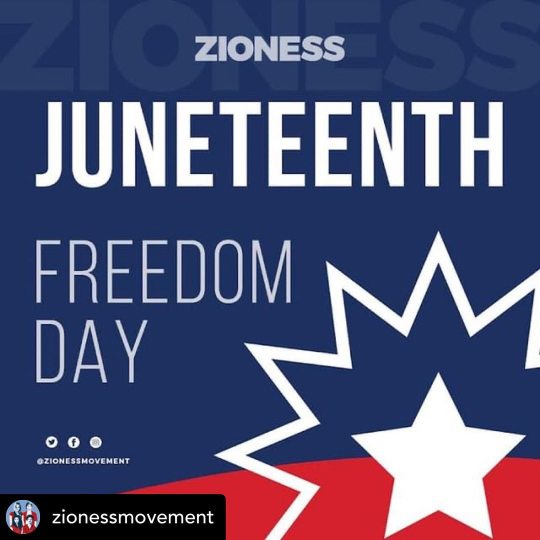
Posted @withregram • @zionessmovement Every June 19th, we commemorate Juneteenth, the day in 1865 when African Americans in Texas were finally liberated from enslavement – more than two years after the Emancipation Proclamation had formally mandated it. Though June 19th is also known as "Freedom Day" or "Liberation Day," Juneteenth reminds us of the ongoing collective fight for true liberation. While enslaved people were freed from literal shackles in 1865, centuries-old institutionalized white supremacy continues to enchain far too many Black Americans. Over 150 years after the first Juneteenth, Black Americans are still directly impacted by the legacies of slavery -- from mass incarceration, to excessive police force, to intentional suppression of democratic rights. In the spirit of Tikkun Olam, we must all commit to an unwavering allyship to our Black siblings. As Jews, we understand what liberation means—we celebrate our freedom from oppression every year during Passover. We also must be aware that for our Black Jewish siblings, the compounding struggles for liberation from systems rooted in antisemitism and anti-Blackness are painful and ongoing. Every day, we call on all Zionesses and every Jewish American to do the work to confront our own biases, amplify Black voices, and ultimately, change racist policies to make America truly live up to its fundamental ideals. Download Zioness's Juneteenth Resource Guide (link in bio), co-created with the amazing Black Jewish women at Jewbian Princess. And be sure to register for Zioness's Juneteenth Celebration, happening Tuesday, June 21 at 8:30pm ET on Zoom. (link in bio) https://www.instagram.com/p/Ce_J1lkuEpV/?igshid=NGJjMDIxMWI=
1 note
·
View note
Text

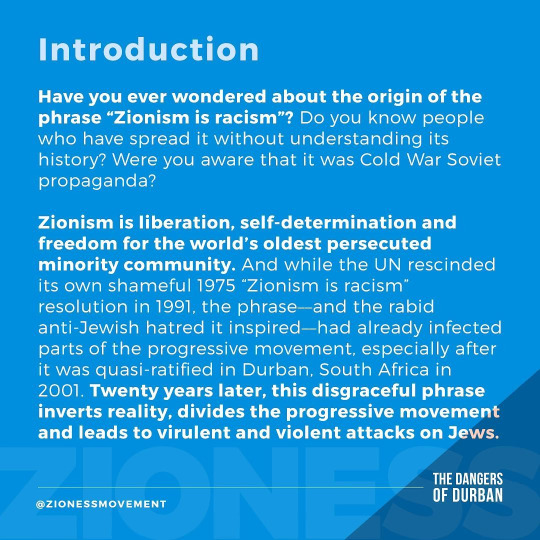
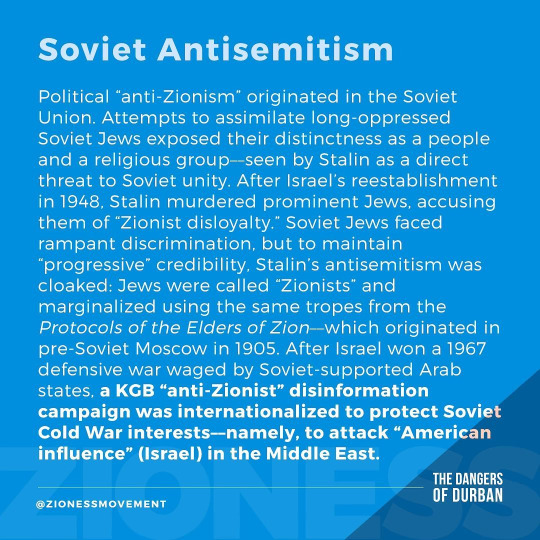
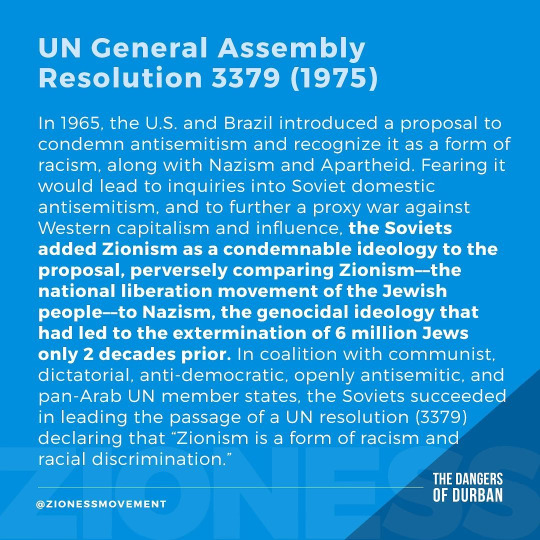
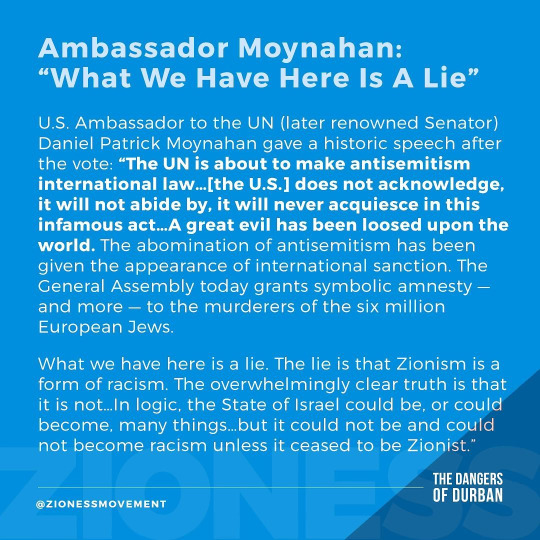
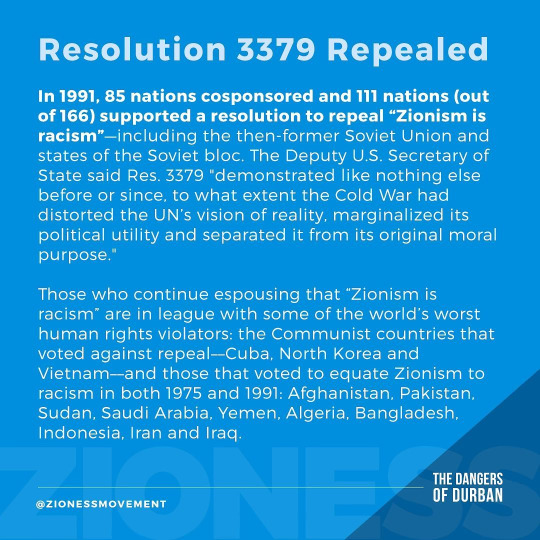
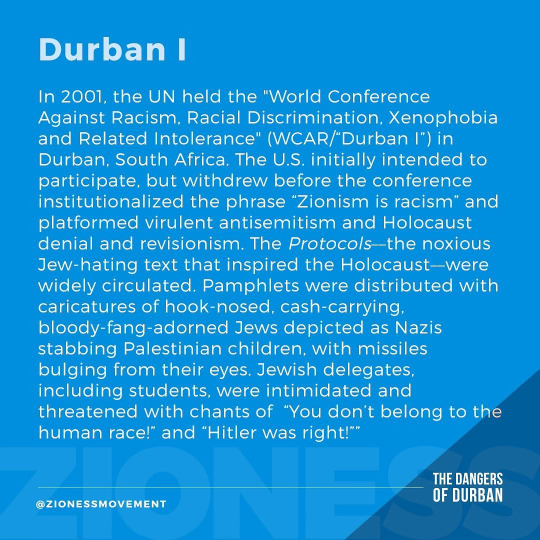
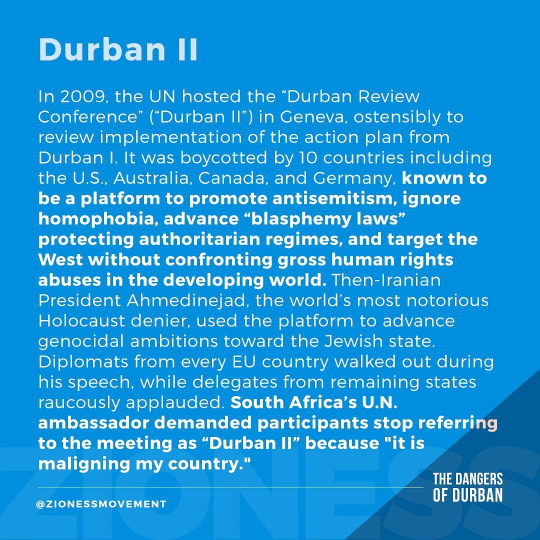
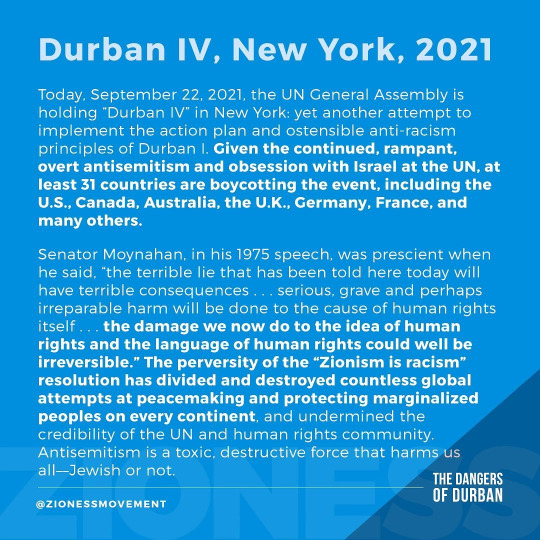
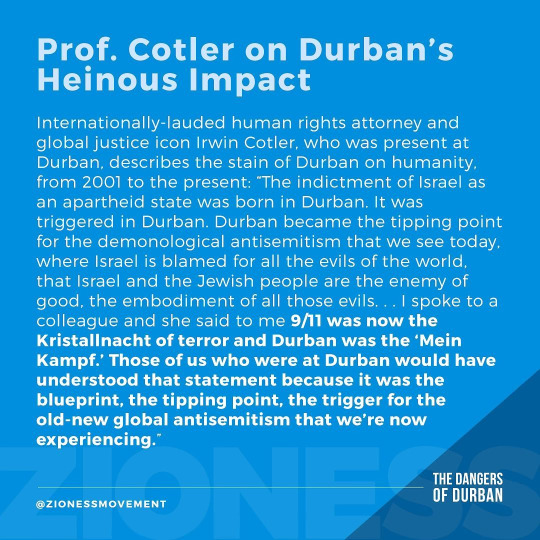
42 notes
·
View notes
Link
SFSU recently announced it would be welcoming Leila Khaled on Sept. 23 — a member of the terrorist organization PFLP, to speak via Zoom to SFSU students. The presentation will be hosted by Professor Rabab Abdulhadi, who declared Khaled to be a “revolutionary Palestinian militant and feminist icon.” Khaled was the first female plane hijacker. Abdulhadi described her as an “inspiration.”
Imagine, for a moment, an SFSU professor hosting an anti-LGTBQIA speaker who had been involved in violent actions to terrorize members of the LGBTQIA community for the crime of fighting for their own liberation. Imagine an SFSU professor hosting a white supremacist who had acted on his racism to terrorize Black Americans, and remained wholeheartedly committed to those efforts in the future. Would there not be an uproar? Shouldn’t we expect one? At the very least, we would demand the university issue a public statement strongly condemning the speaker and his or her violent, unconscionable and intolerant views — even while reaffirming its mandates under the free speech clause of the First Amendment.
SFSU cannot remain silent about a university-sponsored event elevating the message of someone who used planes as weapons to terrorize innocent people. Surely there are other ways to promote the legitimate concerns of the Palestinian people than to honor those who have targeted civilians with violence, and whose advocacy seeks the destruction of the state of Israel, home to more than half of the world’s Jews.
SFSU must declare its legally mandated commitment to protecting Jewish students, including their Zionism, and reject any suggestion that that commitment is at odds with its support for Palestinian liberation. In fact, the diversity of SFSU’s campus and its storied history in the fight for justice gives it a unique opportunity to bring Jewish, Israeli, Arab, Muslim and Palestinian students together to serve as a microcosm of the larger world, and work to advance dialogue, coexistence and mutual understanding. Efforts to tear students apart, uplift one group at the expense of another, or target or demonize Jews are simply unacceptable, and the university must say so.
16 notes
·
View notes
Link
LGBTQ, Jewish and feminist organizations called Wednesday night on the DC Dyke March to apologize for their ban on the Jewish Star of David and Israeli flags.
While there was originally no official announcement, after participants inquired, they discovered that they would not be able to bring Israeli flags or related national symbols to the march. Organizers later wrote on Facebook that, "participants [may] not bring pro-Israel paraphernalia."
While there was originally no official announcement, participants who inquired discovered that they would not be able to bring Israeli flags or related national symbols to the march.
"We ask the organizers to hold true to their mission of inclusivity as stated on their website: 'The DC Dyke March exists to celebrate and center all Dykes," a statement by Zioness Movement, A Wider Bridge, Jewish Community Relations Council of Greater Washington and AJ Campbell - former Director of The Nice Jewish Girls and founder of The Jacobs Tent Project - said in response to the DC Dyke March's decision. "Together we call on the DC Dyke March to apologize to the community and reverse course by allowing Dykes wishing to carry all Jewish and Israeli symbols to march as their full, authentic selves."
This controversy is not new. Two years ago, a similar incident occurred when the Chicago Dyke March's organizers kicked out several people for carrying Jewish Pride flags.
However, the following year, Palestinian flags were seen waving at the Chicago march.
Its been 12 years since the last Dyke march in DC, according to The Washington Post. The organizers said they brought the march back to life because it was badly needed, as LGBTQ services and legal protections were being erased, The Jerusalem Post reported.
----
Oh wonderful; they’re franchising.
1K notes
·
View notes
Text
Zioness Has Another Manifesto
Zioness, the progressive Zionist group, has released a new "activist's guide" on the issue of racial justice. It consists of:
One page on the need to overcome implicit bias;
One page on the need to "show up" for racial justice, even when one encounters antisemitism; and
Six pages on how to respond to antisemitic tropes (many, though not all, Israel- or Zionism-related) one might encounter while engaging in racial justice work.
This distribution of attention -- centering antisemitism in a pamphlet supposedly focused on racial justice -- has caused Zioness to be the target of numerous social media dunks. I think many of them are deserved, albeit with a few minor reservations. Here are my quick thoughts:
From its inception, my primary critique of Zioness -- and I've expressed this personally to their leadership -- is that they resolutely refuse to declare what progressive values demand with respect to Israel. Their justification for their reticence is that they are a domestic policy organization -- a response that is never going to sit well for a group called "Zioness". And documents like this only emphasize why this stance is untenable: Zioness can't forward opinions about Israel and then say "we don't take a position on that" when people ask them to register opinions on Israel. It's a circle they're never going to be able to square, and until they steel themselves and have the guts to forthrightly say "progressivism demands X, Y and Z out of Israel", people are going to going to be justified in looking at them with a skeptical eye.
It may be that a guidebook offering suggestions on how to respond to antisemitic tropes a progressive Jew may encounter while engaging in racial justice activism would be useful. But if you're going to make such a resource, don't title it "Racial Justice: An Activist's Guide". An activist's guide to racial justice should center questions of racial justice -- period. This is the locus of the criticisms Zioness is getting over this document, and it is absolutely correct. Creating a document on "racial justice" that has barely any direct discussion of racial justice is almost impossibly cringe-worthy.
Of course, the possibility that it might be useful to have a guidebook on how to respond to antisemitism while engaging in racial justice work also poses the question of whether now is the right moment to center that conversation. There is, shall we say, good reason to be skeptical on this front.
What little substance there is on racial justice is, to be generous, perfunctory. I'm probably more attached to implicit bias as a useful framing device for understanding contemporary racism than many of my colleagues in the progressive world (it's falling out of vogue), and even I'd say that talking about that alone is woefully incomplete. This is a case where something is worse than nothing -- if they hadn't made the limp gesture towards talking about racial justice qua racial justice, maybe it would have been clear that this document was meant to serve a different purpose (namely, "Responding to Antisemitic Tropes in Racial Justice Activism"). Of course, if that purpose had been made evident it would have more clearly posed the question of whether now was the right time to center that conversation. See the previous bullet point.
I've seen for awhile now the allegation that Zioness is an "astroturf" organization. There's virtually no evidence this is true. Moreover, anyone who knows anything about the constitution of American Jewish community politics should very well know it isn't true. Anyone with a modicum of knowledge about the politics of the American Jewish community -- and Zioness' critics certainly are included -- knows that there are a great many American Jews who (a) have relatively conventional "pro-Israel" politics, (b) have relatively conventional progressive domestic politics, and (c) feel aggrieved when they see these two commitments treated as antithetical to one another. Even if one hates that particular political cocktail, surely there's no dispute about its prevalence. Given that, there's no grounding to the idea that Zioness, which centers its appeal to just that political intersection, could only have sprung up via artificial seeding.* Since I'm confident that Zioness' critics are not ignorant about the political composition of the American Jewish community, I'm equally confident that their use of "astroturf" is entirely as a slur (meaning something like "activist group with more conventional and less radical politics than mine"), not an analytical category.
Many of the document's critics have cast it as specifically focused on "defending Israel" rather than addressing antisemitism more broadly. Much of the "antisemitic tropes" they address are Israel-related, but not several are not (ex: "Jews were behind the Atlantic Slave Trade" or "White nationalism isn’t about Jews"). There's something interesting about this, because formally speaking the elision isn't necessary: the locus of the critique -- that, especially right now, the centerpiece of a document on "racial justice" should be "racial justice" -- would I think carry equal punch if Zioness' document were accurately described as talking about antisemitism. So why fudge the description? The answer is that the criticizing "Israel talk" is more comfortable terrain for many compared to criticizing "Jewish talk", and so we see activists instinctively slide into the former even in cases where analytically they're just as much talking about the latter.
The tl;dr is that Zioness is a regular grassroots organization with a pretty obvious base of support, pairing conventional pro-Israel views with conventional mainstream Democratic domestic views. That, on its own, isn't too remarkable. But the document they've produced on "racial justice" is (a) justly being mocked for having a barely even perfunctory focus on racial justice; (b) bad on its own terms; (c) poorly timed with regard to its actual-albeit-understated purpose, and (d) inadvertently demonstrative of how Zioness' ostensible commitment to being a purely "domestic policy organization" that can't be expected to take positions on what progressive values mean for Israel is untenable.
* The closest evidence one has for Zioness being "astroturf" comes from its early funding from the right-wing Lawfare Project and Brooke Goldstein. That would raise legitimate flags, except that Goldstein has been extremely vocal about how much she hates Zioness precisely because they refused to take the pseudo-left concern-troll line that she had expected out of them (which is to say, they've actually been independent). The fallout has gotten so intense that Zioness has outright blocked Goldstein on Twitter. Whatever Goldstein's initial intentions, she'd be the first to agree that Zioness has charted its own path.
via The Debate Link https://ift.tt/2zqxT8V
7 notes
·
View notes
Photo
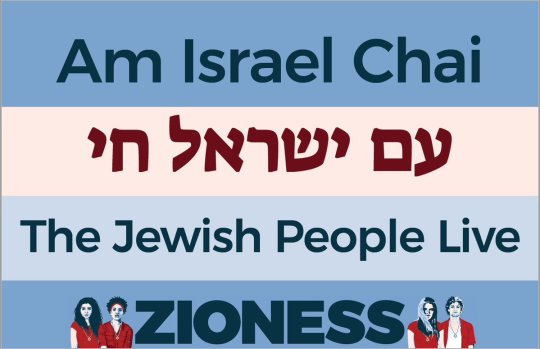
Who's marching with us against antisemitism in NYC today?! We can't wait to see u for this powerful event –– meet up with Zioness & grab your poster @ 10:30am at 'Wichcraft on Worth/Broadway!
Zioness
26 notes
·
View notes
Photo

Beverly Oliver, Zioness, oil pastel on board, 12 x 16 in.
4 notes
·
View notes
Text
A Teach In Before the Women's March
A Teach In Before the Women’s March
Sunday night I had the privilege of being part of the ZIONESS sponsored Teach- In before the upcoming Women’s March. As you may be aware the Women’s March has been roiled in Antisemitism. Well the truth is some of the leader’s of the DC March have been on record with Anti-Semitic speech and supporting virulent Anti-Semitic and anti-LGBTQ people including Louis Farrakhan head of Nation of…
View On WordPress
0 notes
Text
✡️ Ann Lewis @IsraelCampus #Feminist. #Zionist. Hero. Yesterday, Ann, @ZionessMovement @AWiderBridge @JCRCgw stood up to hate and won. Kol hakavod! Share on Facebook: https://t.co/IK2a3csqAb Thanks to @dcdykemarch for bringing everyone against #Antisemitism together this weekend! pic.twitter.com/xcQsSMGVht
— WoMen Fight AntiSemitism (@WoMenFightAS) June 8, 2019
8 notes
·
View notes
Link
I fully respect how A Wider Bridge, Zioness, and the Anti-Defamation League chose to deal with the Dyke March’s ban: call it antisemitism and essentially force their way in. But I don’t think it’s ultimately effective — the problem of leftist antisemitism grows exponentially every day — and it is not, in my opinion, the dignified liberal Jewish response.
Jews should not be groveling to be part of groups that hate us — we should not be forced to pray to the false god of identity politics.
Moses gave us a blueprint on how to deal with situations like this. Throughout most of our history, we were not in a position to follow this blueprint. Today we are.
But in the name tikkun olam, many of us have forgotten that in order to be a light unto nations we first have to be a light unto ourselves. We have come to tolerate hate against Jews that we would never tolerate against any other group. But we can’t help anyone else until we strongly unify ourselves against hate from both the left and the right.
The normalization of antisemitism on the left is based on an easily refutable set of lies about Israel and Jews repeated over and over again on campuses, in the media, and now in Congress. The Jewish liberal response is not to beg the perpetrators and pawns of these lies to be part of this pre-genocidal hatefest. The liberal Jewish response is to correct the lies — to tell the truth over and over again; to pull funding from any group or university that continues to employ anyone who perpetuates the lies; and, perhaps most important, to stand tall throughout the process.
4 notes
·
View notes